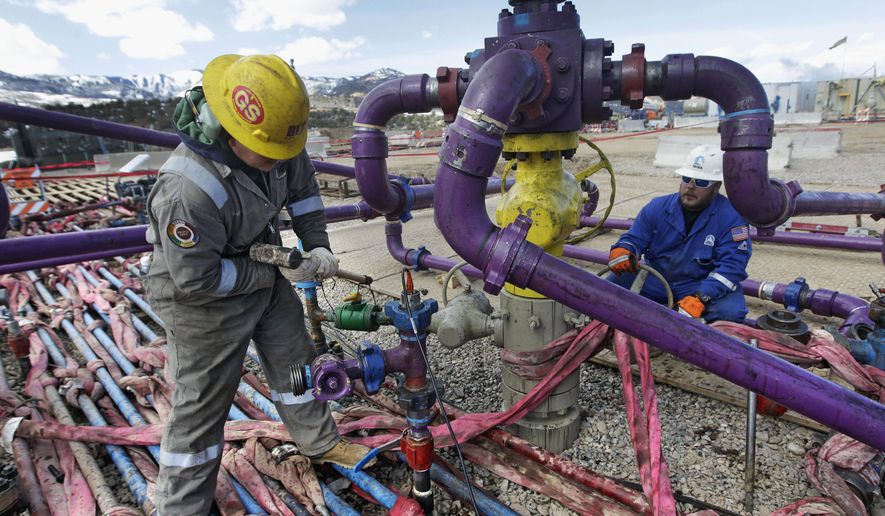Two key House Republicans have called on the Trump administration to investigate whether Russia is trying to undermine the U.S. energy industry by funding environmental activism as part of a “propaganda war against fossil fuels.”
Russia’s goal is to “suppress the widespread adoption of fracking in Europe and the U.S.,” according to a letter to Treasury Secretary Steven Mnuchin from House Science, Space and Technology Committee chairman Lamar Smith and energy subcommittee chairman Randy Weber.
“If you connect the dots, it is clear that Russia is funding U.S. environmental groups in an effort to suppress our domestic oil and gas industry, specifically hydraulic fracking,” said Mr. Smith, Texas Republican, in a Friday statement.
“They have established an elaborate scheme that funnels money through shell companies in Bermuda,” he said. “This scheme may violate federal law and certainly distorts the U.S. energy market. The American people deserve to know the truth and I am confident Secretary Mnuchin will investigate the allegations.”
The Republicans said the panel is already conducting oversight into “what appears to be a concerted effort by foreign entities to funnel millions of dollars through various non-profit entities to influence the U.S. energy market.”
Certainly Russia has a motive. The widespread adoption of hydraulic fracturing and horizontal drilling has fueled an energy boom in the United States that threatens Russian exports of oil and natural gas, which accounted for 68 percent of the country’s export revenue in 2013.
The letter pointed to reports that Russian entities may have funneled millions through a Bermuda shell company, Klein Ltd., to the Sea Change Foundation in San Francisco, which has in turn provided grants on anti-fracking groups like the Sierra Club and the League of Conservation Voters Education Fund.
Proving such a link is another matter. The letter acknowledged that the “Russian government and complicit parties have executed a political agenda with little or no paper trail.”
“By incorporating in Bermuda, Klein is not required to disclose its donors’ identities or countries of origin,” the letter said.
Environmentalists have hotly denied doing the bidding of Russian oligarchs. Sierra Club legislative director Melinda Pierce denounced the letter’s claims as “pathetic” and “absurd and false smears.”
“If Congressional Republicans are so concerned about Russian influence, they should start seriously investigating that country’s interference in our election, not attacking long-standing environmental organizations,” said Ms. Pierce in a Saturday statement to E&E News.
Allegations of a connection between Russian president Vladimir Putin and environmental advocacy groups are hardly new.
In 2014, former U.N. Secretary-General Anders Fogh Rasmussen said that Russia has “engaged actively with so-called non-governmental organizations—environmental organizations working against shale gas—to maintain European dependence on imported Russian gas.”
Former Secretary of State Hillary Clinton said during a private 2014 meeting that Russia had funded “phony environmental groups” to fight pipelines and fracking, according to an email leaked last year by WikiLeaks from Clinton campaign manager John Podesta’s account.
Drew Johnson, senior fellow at the Taxpayers Protection Alliance, cited an intelligence report on Russia’s election meddling showing “clear evidence that the Kremlin is financing and choreographing anti-fracking propaganda in the United States.”
“By targeting fracking, Putin hopes to increase oil and gas prices, destabilize the U.S. economy and threaten America’s energy independence,” said Mr. Johnson in the Jan. 29 op-ed in Newsweek.
University of Colorado professor Roger Pielke Jr., a prominent climate skeptic, tweeted on Saturday that, “If accurate, a Russian strategy of using US enviros & scientists to act unknowingly to advance Russian interests is genius & remarkable.”
2/ If accurate, a Russian strategy of using US enviros & scientists to act unknowingly to advance Russian interests is genius & remarkable.
— Roger Pielke Jr. (@RogerPielkeJr) July 8, 2017
• Valerie Richardson can be reached at vrichardson@washingtontimes.com.




Please read our comment policy before commenting.